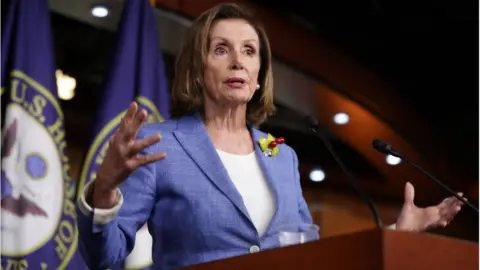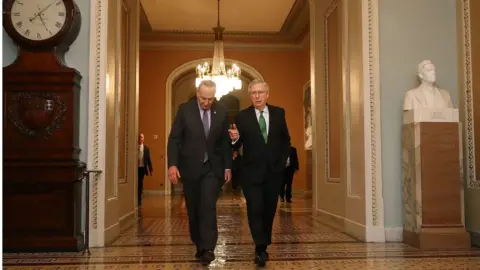Are Pelosi and the Democrats ready for a bumpy ride?

 Getty Images
Getty ImagesAs Congress reconvenes, Democrats can look forward to a bumpy autumn full of legislative challenges.
Don't call it a vacation. For six weeks, members of the House of Representatives were out of Washington for what the legislative calendar officially refers to as "district work periods". But whether they were connecting with constituents or lounging on the beach, the summer legislative recess is over - and Nancy Pelosi and her Democratic majority have a busy few months ahead of them.
Can they navigate a political minefield, reaching agreements with Senate Republicans and the White House when possible and winning confrontations where necessary?
Here's a look at some of the challenges in store.
Impeachment conundrum
Practically since the day Ms Pelosi reclaimed the House speaker's gavel in January she has faced pressure to authorise "formal" impeachment investigations into the president. It's become a sword of Damocles - but no one is quite sure whose head it dangles above.
 Getty Images
Getty ImagesProponents for moving forward argue that the president's actions demand congressional action and anything less would be a dereliction of duty. Opponents counter that impeachment isn't popular with the American public and could put the Democratic House majority in danger in next year's congressional elections.
What's more, the whole endeavour is pointless, they say, given the overwhelming likelihood that the Senate - controlled by Republicans - would never vote to remove the president.
For months Ms Pelosi has walked a fine line between condemning the president for a wide range of actions and tamping down impeachment fervour. Her ability to continue this balancing act as Congress reconvenes, however, will be sorely tested. Already more than 130 of the 236 Democrats in the House have spoken out in favour of impeachment hearings. That number keeps growing.
On Wednesday the House Judiciary Committee - the starting point for impeachment proceedings - is planning to define the "parameters" of its inquiry into the president.
According to reports, that will include a range of allegations - including presidential obstruction of Robert Mueller's Russian election-meddling investigation, 2016 election-eve hush-money payments to prevent two women from from saying they had affairs with Donald Trump, presidential profiting from government business and promises of presidential pardons for individuals who broke the law to advance the White House's immigration policies.
A Democratic source cited by Politico said the committee vote will increase the "officialness" of the probe. That might translate into giving the committee firmer legal standing to issue subpoenas and compel testimony, whether or not the media and the public view the process as a formal impeachment inquiry.
It could all amount to nothing - or become the first few pebbles rolling down a hill that starts a political avalanche far beyond Ms Pelosi's control.
Keeping the lights on
If impeachment is a slow-moving challenge for Ms Pelosi, there's potential crisis looming much sooner. In three weeks, at the start of the new fiscal year, the current agreement on government funding expires. If Congress doesn't pass, and the president doesn't sign, new spending bills, the government will shut down, greatly reducing federal services.
If this seems painfully familiar, that's because it's only been eight months since the last government shutdown - the longest in US history.
That standoff was provoked by the president's insistence that Congress fund his Mexican border wall. It ended only after Mr Trump declared "victory" - and backed down.
Neither Democrats in the House or Republicans running the Senate appear to have any appetite for a repeat of such political drama on the eve of the 2020 campaign season. Mr Trump, however, is again a wildcard. No one seems to think he wants a shutdown now, but no one expected him to force a shutdown last December either.
The most probable outcome at this point would be a temporary measure that continues government funding at current levels - something that could, conceivably, be extended all the way past next year's elections in November.

Who will take on Trump in 2020?


Gun control, trade deals and drug prices
Government funding bills are an annual task for Congress with all the glamour of paying the household utilities. Impeachment proceedings may garner headlines, but appear destined for extended partisan trench warfare.
If Ms Pelosi and congressional Democrats want to find real legislative glory - passing laws they can point to when running for re-election next year - there are only a handful of avenues for success.
Earlier this year the House voted for new gun control legislation, including comprehensive background checks, but the proposals have stalled in the Senate. Ongoing negotiations between Republicans, Democrats and the White House - prompted by recent mass shootings in Texas and Ohio - might break that logjam, although it will take a level of presidential advocacy not yet demonstrated by Mr Trump.
Ten months ago the White House successfully concluded a new trade agreement with Canada and Mexico that would replace Nafta. The USMCA, as it's known, requires congressional approval - but Democrats in the House have been the ones holding things up.
There's also been talk of legislation to control the rising price of prescription drugs, whether it's easing import restrictions from lower-cost countries like Canada or granting the government new price-setting powers.
Both Republicans and Democrats would like to pass legislation that they could take credit for - and campaign on. But just because it seems like a win-win opportunity doesn't mean success is easy in this political climate.
 Getty Images
Getty ImagesThe window for success is a narrow one. Within a matter of months, focus will shift in earnest to the presidential primaries, while legislators gear up for their own re-election campaigns. This typically means legislative efforts grind to a halt.
The past two general elections have been characterised by widespread voter dissatisfaction in the status quo - and incumbent parties have felt the consequences at the polls.
Both sides have plenty of reasons to break this pattern - and plenty of reasons why they might want to keep it going. That's a recipe for unpredictability in the days ahead.

